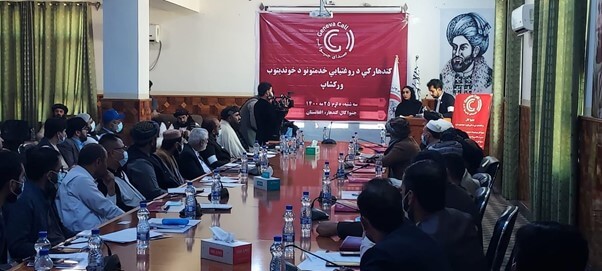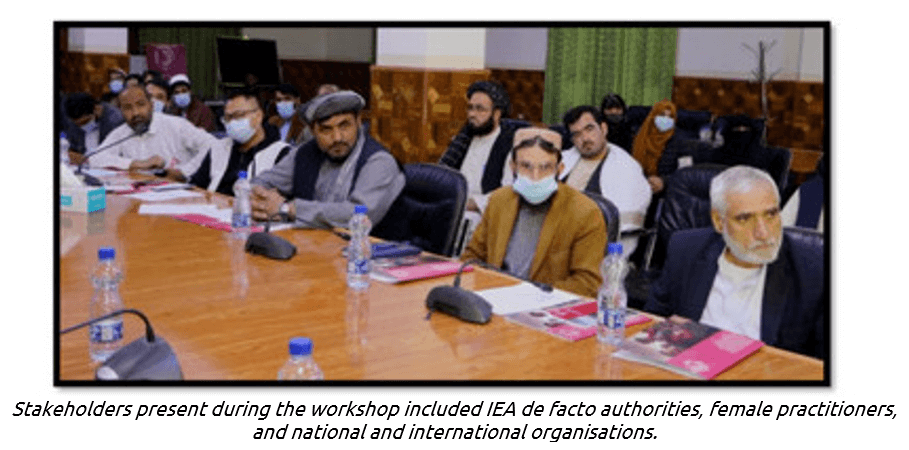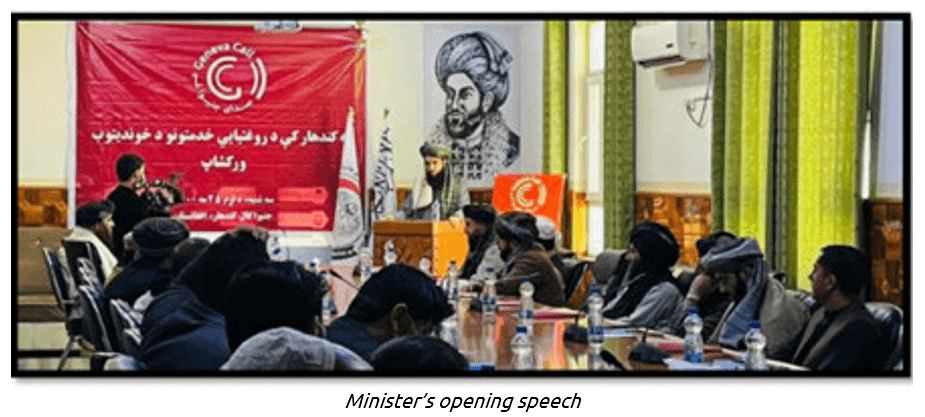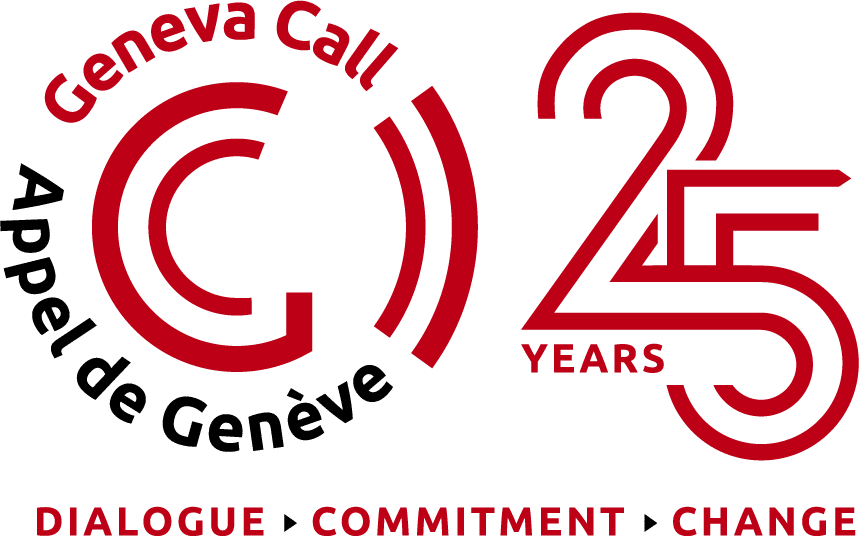
Improving Health Protection in Kandahar, Afghanistan: Recommendations from de facto authorities, NGOs and health practitioners
15 décembre 2021
On 16 November 2021, Geneva Call conducted a workshop on the protection of health care in Afghanistan’s southern province of Kandahar, which was attended by a vast range of participants including the de facto Minister of Health, provincial authorities, international NGOs, UN representatives and health practitioners.
Thanks to the variety of participants present, a comprehensive account of the challenges linked to the protection of health care in Kandahar was discussed, encompassing all participants’ views and perspectives.

Hanifa, a female doctor with the Public Health department, gave a compelling account of how armed men entered health facilities and forced doctors to care for their patients first, a practice that negatively affects doctors’ work and is prohibited by International Humanitarian Law. She added that in remote areas, women who are not accompanied by men are not allowed to go to health facilities, a major obstacle to their access to health. The recruitment of non-professionals in health facilities, military intervention, the non-payment of salaries, and other problems were also mentioned that negatively affect health services in the province.
Another doctor added: “In Kandahar, many health facilities in remote areas have been closed due to the fighting in the past, but now people are complaining about the shortage of medicines, and health workers are calling for a solution.”
The de facto authorities answered this plea for solutions. In his opening speech, the Governor Representative declared: “We give you the assurance that you are protected and that your work will be carried out in a safe environment; your facilities, that are built for the purpose of health care, will never be used as a military base.”
The Minister of Public Health then called on international organisations to highlight the Afghan health system’s challenges internationally in order to get the international community and organisations’ support in solving them. He argued that more attention should be paid to the quality of health services, and that doctors should be better trained to ensure Afghanistan’s independence in health provision. He called all participants in the workshop to work together for a better protection of health care.

These remarks were followed by group discussions that led to a thorough account of the challenges faced when it comes to protecting health care and to important recommendations, a summary of which is included below.
The challenges most often highlighted by participants included:
- Challenges resulting of the armed conflict
- Pressure by armed groups on Health personnel to treat some patients in priority
- Closure of health facilities due to the conflict
- Damage of health facilities’ assets because of the fighting
- Misuse of health infrastructure for military purpose
- Current security challenges
- Air Gun firing by fighters and security personnel which increases stress on patients and health personnel
- Fighters not always wearing military uniforms
- Fighters entering health facilities with weapons
- Lack of safe access for patients and staff due to presence of IEDs
- Challenges linked to the diversion of aid and resources
- Intervention of influential community members and security forces to treat some patients in priority
- Misuse of resources and equipment, such as ambulances mobilised for private use
- Looting of the medical supplies, such as nutrition supplies
- Challenges specific to women
- Lack of permission for female staff to travel without a mahram (male relative). The Mahram is not paid, which discourages women from coming to work.
- Lack of permission for female patients to visit health facilities without a mahram
- Lack of permission for male doctors to check female patients without a mahram

The group discussions led to the following recommendations:
- Towards armed organisations
- Ambulances should not be targeted and should not be used for non-health purpose
- Health facilities should not be closed because of fighting
- Health personnel should not be discriminated against by armed groups or treated as the supporter of one side of the conflict
- The groups involved in fighting should not target the health facilities
- Towards the de facto Government
- Authorities shall introduce and implement appropriate policies to enforce the “no weapon” policy
- Military or police compounds should be relocated away from health facilities
- Civilian and military health centers should be separated
- Female health staff should have the permission to travel without a mahram in a safe environment, or, in the case of a mahram, a financial compensation should be considered for him
- Police and fighters should take effective responsibility in ensuring the security of health facilities and hospitals
- Air gun fire by fighters should be prohibited
- Towards international organizations and NGOs
- Policemen and fighters as well as communities should be trained on the respect of health care, especially on the interdiction to enter health facilities with a weapon
- Fighters should be trained on the protection of health facilities assets from theft and robbery
- Health protection messages should be spread through the media
- The authorities should be engaged with to continue this discussion
- Awareness-raising sessions should be conducted for communities regarding the protection of health facilities and their assets in order to mitigate the risk of looting or personal use
- Awareness-raising sessions should be conducted on mine education and advocacy should be conducted for mine clearance
Following these recommendations, Geneva Call’s team expanded the training sessions for armed forces and civil society organizations in Kandahar and will include the above challenges and lessons learned in the future training sessions and humanitarian engagement with communities and armed organizations, to ensure that health care services, personnel and facilities are effectively protected.
___
This programme is part of Geneva Call’s engagement with armed forces and communities in Kabul and in the North, the East, the South of Afghanistan. For more detail on our action in Afghanistan, follow us on Twitter at @genevacallafgh.
